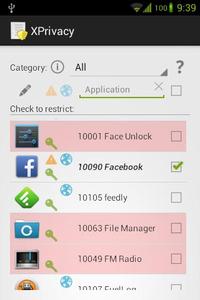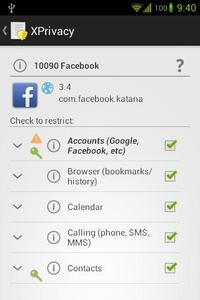* XPrivacy
 The ultimate, yet easy to use, privacy manager.
The ultimate, yet easy to use, privacy manager.This application requires the Xposed framework to be installed
See here for the installation instructions: https://github.com/M66B/XPrivacy#installation
XPrivacy can prevent applications from leaking privacy sensitive data. XPrivacy can restrict the categories of data an application can access. This is done by feeding an application with no or fake data. There are several data categories which can be restricted, for example 'contacts' or 'location'. For example, if you restrict access to contacts for an application, this will result in sending an empty contact list to the application. Similarly, restricting an application's access to your location will result in a set location being sent to the application.
XPrivacy doesn't revoke (i.e. block) permissions from an application, which means that most applications will continue to work as before and won't force close. There are two exceptions to this, access to the internet and to external storage (typically an SD card) is restricted by denying access (revoking permissions). There is no other way to realize this, since these permissions are handled by Android in a special way. Android delegates handling of these permission to the underlying Linux network/file system. XPrivacy will fake offline (internet) and/or unmounted (storage) state, but some applications try to access the internet/storage nevertheless, potentially resulting in crashes.
If restricting a category of data for an application results in problems for the application, it is possible to allow access to the data category again to solve the issue.
By default, all newly installed applications will have no access to any data category at all, to prevent a new application from leaking sensitive data right after installation. Shortly after installing a new application, XPrivacy will ask which data categories you want the new application to have access to. XPrivacy comes with an application browser, which allows you to quickly enable or disable applications' access to a particular data category for example to view your calendar. It is also possible to edit all data categories for one application.
To help you identify potential data leaks, XPrivacy will monitor attempts made by all applications to access sensitive data. XPrivacy will display a warning triangle icon as soon as data of a data category has been used. If an application has requested Android permissions to access data in a data category, this will be displayed with a key icon. XPrivacy will also display if an application has internet access, indicating that the application poses a risk of sharing the data it obtains with an external server.
All documentation, including usage instructions, can be found here: https://github.com/M66B/XPrivacy#xprivacy
If you need support, you can use this XDA thread: http://forum.xda-developers.com/showthread.php?t=2320783
Recent changes:
https://github.com/M66B/XPrivacy#changelog
Content rating: Everyone
Author: Marcel Bokhorst
Version: 1.8.3
Market link: biz.bokhorst.xprivacy
Web site: http://www.faircode.eu/xprivacy/


Source code:
Code license:
Market downloads: 5,000-10,000
Market rating: 4.9 / 5.0
Category: Top:/Applications/Tools
Added: 2013-07-24
Updated: 2013-08-05
Hits: 743



